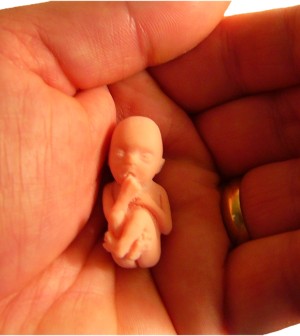- 8 Ways to Increase Dopamine Naturally
- 7 Best Breads for Maintaining Stable Blood Sugar
- Gelatin vs. Collagen: Which is Best for Skin, Nails, and Joints?
- The Long-Term Effects of Daily Turmeric Supplements on Liver Health
- Could Your Grocery Store Meat Be Causing Recurring UTIs?
- Are You Making This Expensive Thermostat Error This Winter?
- Recognizing the Signs of Hypothyroidism
- 10 Strategies to Overcome Insomnia
- Could Artificial Sweeteners Be Aging the Brain Faster?
- Techniques for Soothing Your Nervous System
Breast Milk With Solid Foods Might Stave Off Allergies


Giving babies solid food while still breast-feeding, and waiting until 17 weeks to do so, might protect the infants from food allergies, British researchers say.
The overlap between starting solid foods while still breast-feeding teaches the immune system that food is safe and prevents food allergies, the researchers theorized.
“Mothers should continue to breast-feed beyond introducing solids into the diet so the immune system can benefit from the immunological factors in breast milk that educate the immune system,” said lead researcher Kate Grimshaw, a research fellow and allergy specialist at the University of Southampton.
“My theory was that if food allergens — those things that infants actually become allergic to — aren’t there at the same time as the breast milk, the breast milk can’t educate the immune system,” she said.
The researchers said they identified when this process is likely to begin. “Introducing solid food before 17 weeks was associated with an increased risk of children developing food allergies,” Grimshaw said.
Although other studies have found an association between when solid food is started and the risk for food allergies, none has established when infants are most at risk for developing food allergies, she said.
“We have pinned down the risky period as being before 17 weeks,” Grimshaw said.
The report was published Nov. 18 in the online edition of the journal Pediatrics.
At least one expert questioned the conclusions, however, saying the study doesn’t prove Grimshaw’s theory.
Dr. Vivian Hernandez-Trujillo, director of allergy and immunology at Miami Children’s Hospital, said the study supports the importance of breast-feeding, but doesn’t nail down why food allergies develop.
“Unfortunately, we still don’t have all the answers when it comes to food allergies,” Hernandez-Trujillo said. “It appears that breast-feeding may be protective, but we still don’t know why.”
Why breast milk might protect children from food allergies isn’t really known, she said. “It may have to do with [antibodies], but that would be totally speculative,” she said.
“Breast-feeding is good for the child in many different ways, and it may be helpful in possibly preventing food allergies,” she said.
For the study, Grimshaw and her colleagues looked at the diets of 41 children who developed food allergies by age 2. They compared that with foods eaten by 82 children without food allergies.
The researchers found that the children with food allergies were started on solid foods earlier (at about 16 weeks or younger) than children without allergies. They also were less likely to be breast-feeding when introduced to any form of cow’s milk protein, which is found in cow’s milk and some processed foods.
“This study supports the current American Academy of Pediatrics’ allergy-prevention recommendations and the European Society of Pediatric Gastroenterology, Hepatology and Nutrition’s recommendations on complementary feeding to not introduce solid [foods] before four to six months of age,” the researchers said.
“It also supports the American Academy of Pediatrics’ breastfeeding recommendations that breastfeeding should continue while solid [foods] are introduced into the diet and that breastfeeding should continue for one year or longer, as mutually desired by mother and infant,” they said.
More information
For more information on breast-feeding, visit the U.S. National Library of Medicine.
Source: HealthDay
Copyright © 2026 HealthDay. All rights reserved.










